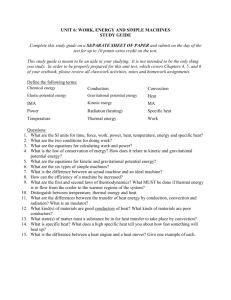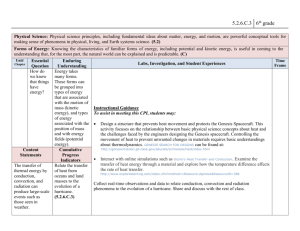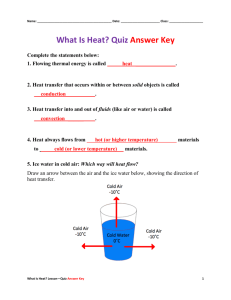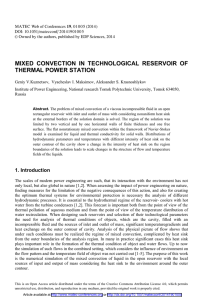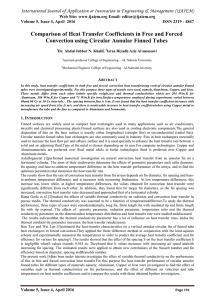14-29 window, the rate of total heat transfer through the window,... 14-37
advertisement
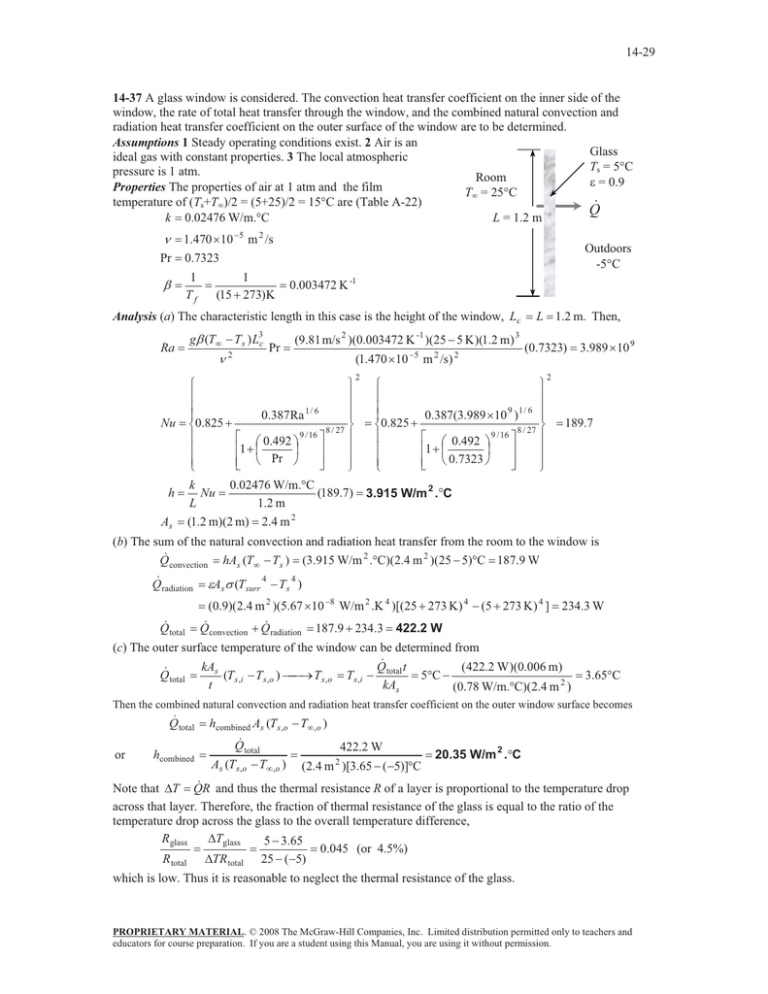
14-29 14-37 A glass window is considered. The convection heat transfer coefficient on the inner side of the window, the rate of total heat transfer through the window, and the combined natural convection and radiation heat transfer coefficient on the outer surface of the window are to be determined. Assumptions 1 Steady operating conditions exist. 2 Air is an Glass ideal gas with constant properties. 3 The local atmospheric Ts = 5qC pressure is 1 atm. Room H = 0.9 Properties The properties of air at 1 atm and the film Tf = 25qC temperature of (Ts+Tf)/2 = (5+25)/2 = 15qC are (Table A-22) Q L = 1.2 m k 0.02476 W/m.qC 1.470 u 10 5 m 2 /s Pr 0.7323 1 1 E (15 273)K Tf Q Outdoors -5qC 0.003472 K -1 Analysis (a) The characteristic length in this case is the height of the window, Lc Ra gE (Tf Ts ) L3c Q2 Pr (9.81 m/s 2 )(0.003472 K -1 )(25 5 K )(1.2 m) 3 (1.470 u 10 5 m 2 /s) 2 2 L 1.2 m. Then, (0.7323) ½ ­ ½ ­ ° ° ° ° ° ° ° 9 1/ 6 ° 1/ 6 0.387(3.989 u 10 ) 0.387Ra ° ° ° ° Nu ®0.825 ®0.825 8 / 27 ¾ 8 / 27 ¾ ° ° ª § 0.492 · 9 / 16 º ° ° ª § 0.492 · 9 / 16 º ° ° «1 ¨ » ° ° «1 ¨ » ¸ ¸ °¿ °¯ «¬ © 0.7323 ¹ »¼ °¿ °¯ «¬ © Pr ¹ »¼ k 0.02476 W/m.qC h Nu (189.7) 3.915 W/m 2 .qC L 1.2 m As (1.2 m)(2 m) 2.4 m 2 3.989 u 10 9 2 189.7 (b) The sum of the natural convection and radiation heat transfer from the room to the window is Q hA (T T ) (3.915 W/m 2 .qC)(2.4 m 2 )(25 5)qC 187.9 W convection Q radiation Q total s s f HAs V (Tsurr Ts 4 ) 4 (0.9)(2.4 m 2 )(5.67 u 10 8 W/m 2 .K 4 )[(25 273 K ) 4 (5 273 K ) 4 ] 234.3 W Q Q 187.9 234.3 422.2 W convection radiation (c) The outer surface temperature of the window can be determined from kAs Q t (422.2 W )(0.006 m) (Ts ,i Ts ,o ) 5qC o Ts ,o Ts ,i total Q total t kAs (0.78 W/m.qC)(2.4 m 2 ) 3.65qC Then the combined natural convection and radiation heat transfer coefficient on the outer window surface becomes Q total or hcombined hcombined As (Ts ,o Tf ,o ) Q 422.2 W total As (Ts ,o Tf,o ) (2.4 m )[3.65 (5)]qC 2 20.35 W/m 2 .qC Note that 'T Q R and thus the thermal resistance R of a layer is proportional to the temperature drop across that layer. Therefore, the fraction of thermal resistance of the glass is equal to the ratio of the temperature drop across the glass to the overall temperature difference, Rglass 'Tglass 5 3.65 0.045 (or 4.5%) R total 'TR total 25 (5) which is low. Thus it is reasonable to neglect the thermal resistance of the glass. PROPRIETARY MATERIAL. © 2008 The McGraw-Hill Companies, Inc. Limited distribution permitted only to teachers and educators for course preparation. If you are a student using this Manual, you are using it without permission.


